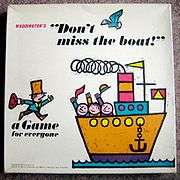Don't Miss The Boat
 | |
| Publisher(s) | Parker Brothers, Waddingtons |
|---|---|
| Players | 2-4 |
| Age range | 4 and up |
| Setup time | 1 minute |
| Playing time | 10 minutes/random |
| Random chance | None |
| Skill(s) required | Tactics, Strategy |
Don't Miss The Boat is a board game for two to four players, with no dice or cards or element of elimination. The rules[1] are simple enough to be mastered by a five-year-old, yet there is no element of chance, and experienced players can use sophisticated tactics and strategies to win. The game was first published by Parker Brothers[2] in 1965, later by Waddingtons.[3] The title is currently owned by Hasbro and is no longer manufactured.
Play
The board consists of a raised, cross shaped platform divided into squares on which the pieces move[4] surrounded by a circular "canal". Each player has 8 pieces (or "men") and a boat of the same color which is located at one of "docks" at the ends of the cross. The initial position of all the pieces and boats is always the same. The winner is the first player to successfully move five of their eight pieces into their own boat. Players take turns to move one piece to an adjacent square in any direction (including diagonals). Pieces can move further by jumping over one or more of their own or opponents' pieces, making a series of jumps where possible. When a player jumps into their boat, all the boats are moved clockwise around the board, one quarter turn. As a result, players will often find their own boat moves away from the dock they have moved one of their pieces to, giving the game its name.
Comparison with other games
Although the objective of the game (moving a number of pieces from start to finish) is superficially similar to ludo, there are no dice and there is no element of luck. The movement of the pieces is determined purely by the rules, as in chess or draughts. The pieces are moved similarly to a king in chess, but the ability to extend moves by jumping over other pieces has similarities to draughts, although pieces are not eliminated during this process: it is more similar in this respect to halma or Chinese checkers.
Tactics and strategy
Players can attempt to predict the movement of other players' pieces, and the effect this will have on the position of the boats. Tactics include frustrating the predictions of other players by choosing not to jump into a boat when expected. This can even be done cooperatively with other players in an attempt to prevent another player from winning.
References
- ↑ "Rules, PDF" (PDF). Hasbro.com.
- ↑ "Don't Miss The Boat". "Board Game Geek".
- ↑ "Don't Miss The Boat (Fan Page)". "Alessandra Russo".
- ↑ "Don't Miss The Boat (Photoset)". "Flickr (psd)".